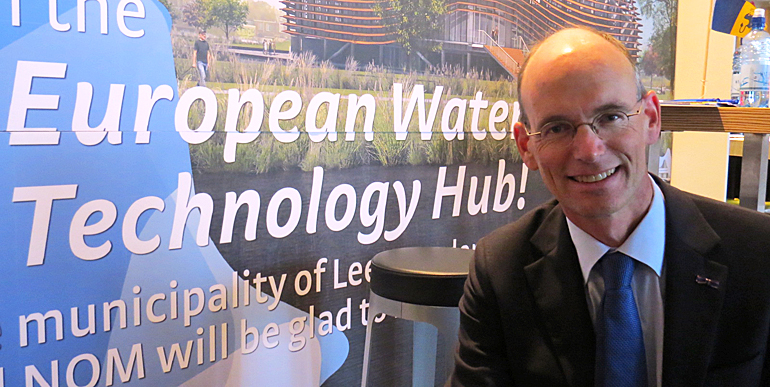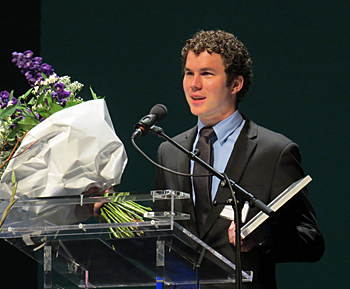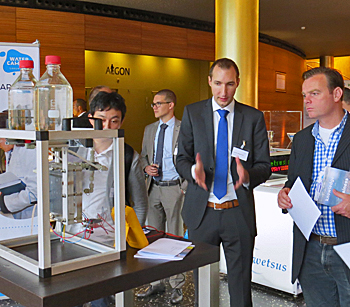Wetsus announces three new research topics: antibiotics, proteins, co2 gradient energy

On the occasion of the annual congress of water technology centre Wetsus, scientific director Cees Buisman announced three new research topics: prevention of the spreading of antibiotics via waste water, recovery of proteins from waste water and energy generation from co2 gradients.
The annual Wetsus congress took place in Leeuwarden, the Netherlands on 6 -7 October.
One of the speakers was Director Hero Prins of European knowledge and innovation centre Climate-KIC and he brought the good news that his centre had approved Wetsus’s request to join as an affiliate partner.
 Belgian Wetsus researcher Dries Parmentier won the Marcel Mulder award for his efforts in developing a desalination process using ionic liquids.
Belgian Wetsus researcher Dries Parmentier won the Marcel Mulder award for his efforts in developing a desalination process using ionic liquids.
Award for research on desalination
The annual Marcel Mulder prize went to Wetsus researcher Dries Parmentier. He won the prize for his important contribution to the development of ionic liquids desalination technology.
Wetsus theme coordinator Michel Saakes won a special prize for being an inspirer as scientist and innovator.
European centre of excellent
Scientific director Cees Buisman (top photo) revealed that Wetsus will change its name as off 1 January. The new full name will be Wetsus European centre of excellence. The new name reflects the ambition of Wetsus to become the water technology hub for Europe and to support the research agenda of the European Institute of Innovation & Technology (EIT).
At the congress it was announced that Wetsus is leading initiatives for four research consortia that meet the European Union's Horizon 2020 research agenda.
Combat antibiotics
In regard of the three new research topics Buisman explained the urgency to combat antibiotic resistant bacteria as they pose a threat to human health. "There is a growing number of resistant organisms that can share their antibiotic resistance genes with environmental organisms. As a result diseases become more difficult to treat if the antibiotics do not work properly anymore", he said.
Buisman mentioned two aspects. "Firstly there is the presence of antibiotics as a chemical substance in waste water. This ends up as a micro- pollutant in surface water. Secondly there is the presence of antibiotic resistant bacteria. We have started a research project on both aspects."
 Wetsus researcher Martijn Wagterveld explains the Capmix cell using ion exchange membranes for desalination.
Wetsus researcher Martijn Wagterveld explains the Capmix cell using ion exchange membranes for desalination.
Removal of antibiotics from waste water
"We will conduct this research together with three Dutch universities and we hope to learn more about the behavior of antibiotics in the sewer system and at a waste water treatment plant. We will also conduct a study on new technologies to remove antibiotics from waste water. There are molecules that can bind antibiotic resistance genes and we like to find out how to apply these molecules”.
Additionally Wetsus intends to start an European research programme on this topic as well.
Buisman hopes that the agriculture sector will also join this programme as animal faeces is another mayor route for antibiotics to end up in surface water.
Recovery of proteins from waste water
Another new research topics for Wetsus is the recovery of proteins from waste water. Wetsus is testing the use of aquatic worms to produce protein-rich animal feed. Another option to explore, Buisman explained, is the use of special bacteria. A new consortium, headed by the Belgian professor Willy Verstraete of the Gent University, will be in charge of this research programme.
The third announced new research item concerns the energy recovery from chimneys and smoke stages. Gas emissions from, for instance, incinerators often contain high co2-concentrations. When emitted, there is a large difference with the co2-concentration in the air around the chimney. Wetsus wants to develop a technology to produce energy from this gradient. It already developed the 'Blue energy' technology, based on the same prinicple using the salt gradient between sea and fresh water.
More information
Wetsus
Leeuwarden, the Netherlands
+31 58 2843000
www.wetsus.nl



